Enter content here PRESIDENT TRAJKOVSKI'S ADDRESS AT EPP SUMMIT IN SOFIA. MIA The current crisis in Macedonia underscores the dilemma that the Balkans today is faced with. The countries in the region will either join the European and Euro-Atlantic structures or they will form a criminal structure. There is no third option, Macedonian President Boris Trajkovski said Thursday in his address at the European People's Party Summit in Sofia.
"For several months now the Macedonian army and police have been targets of organized terrorist attacks. However, those who practice violence have gone from isolated and incidental attacks to conquering territory. Armed terrorist groups from the Kosovo territory organized mass scale terrorist attacks on the Macedonian territory. The attempts to win territory were combined with urban terrorist attacks against police officers in towns. Terrorist groups, using a combination of convincing and force, tried to recruit additional forces among the local Macedonian Albanians. These attempts had an uncertain and limited success in some socially marginalized parts of the local population," Trajkovski said.
According to him, the Macedonian state is fully capable of facing this challenge and therefore there is no room for funeral speeches and tragic scenarios. As in the case of the Kosovo war, when Macedonia was faced with a huge influx of refugees and welcomed more than 360,000 ethnic Albanians from Kosovo, this time again Macedonia demonstrated its capacity and with a highly professional and proportional military operation defeated the terrorist groups.
The restrained military operation was hailed by all international organizations, including NATO and the EU, Trajkovski said, pointing out that terrorist main target was the multi-ethnic character of the Macedonian society and the political consensus in the country.
"In the last decade, the Macedonian society has proven that Macedonian citizens believe in ballots not in bullets. We will not change this conviction of ours," he said, adding that Macedonia managed, despite the extraordinary instable surrounding to establish a model atypical for the Balkan politics, based on the principle of building a common state, of high standards for protection of all persons belonging to national minorities, and on their active participation in the country's political life. In short, a model of a common state, based on the European standards.
Speaking of inter-ethnic relations, Trajkovski said there was always room and necessity for improvement. As compared to the low percentage of Macedonian Albanians in the state administration after the dissolution of former Yugoslavia, today it has been multiplied. Measures of affirmative action are undertaken with respect to enrolment in Universities, employment in the state administration, and election of judges. Ever since Macedonia gained its independence, parties of Macedonian Albanians have been actively participating in the political life with their MP's, ministers, ambassadors, mayors, and members of local municipal councils.
"The prohibition of discrimination has been raised to the level of the highest constitutional principle. However, we must not forget that this is a long process that must take into account not only the criteria of professionalism but also the need for loyalty and responsibility in regards to the state and respect of laws," Trajkovski said.
In pre-school, primary and secondary education, as well as in several areas of higher education, persons belonging to minorities could follow instruction in their mother tongue. Moreover, several months ago the LAW on Higher Education was adopted based on the proposal by Mr. Max van der Stoel, OCSE High Commissioner for National Minorities. In this context, a university would be opened soon in Tetovo, where the teaching would be conducted in Albanian, Macedonia and English language, Trajkovski said.
"In municipalities, mostly inhabited with members of national minorities, in addition to the official Macedonian language, the languages of those minorities are also in official use. In such municipalities, names of streets, places, and signs are written bilingually or trilingually. Moreover, only few days before the outburst of violence, the Government adopted the Draft Law on Local Self-Government, which will significantly increase the jurisdiction of local authorities, Trajkovski said.
Referring to media, the Macedonian president said that Macedonian state had been continuously financing media, which broadcast exclusively in the minority languages, including the Albanian language. The state Television broadcast programs in the Albanian language, and with the annual agenda of the Government it was planned to open a third national TV channel, which will broadcast programs exclusively in the languages of the minorities.
"So, it becomes more than clear that any attempt to blame the Macedonian Constitution for what is happening now would be wrong and incorrect," Trajkovski said adding that Macedonia is firmly committed to defending its territorial integrity, its democracy and all of its citizens.
"We do not have a state to spare. Therefore, we will not talk to the terrorists; instead, we will continue doing everything possible to integrate Macedonian Albanians and persons belonging to other minorities in the process of resolving the crisis. Macedonia is our common home and we are to defend it together. We defeated the attack of terrorism and at the same time we continued and intensified the political dialogue," Trajkovski said in his address at the EPP summit. PRESIDENT TRAJKOVSKI'S BILATERAL MEETINGS IN SOFIA. MIA The bilateral cooperation, situation in Macedonia and in the region were central subjects at today's meeting between the Presidents of the Republic of Macedonia and Bulgaria, Boris Trajkovski and Petar Stojanov, held in Sofia, MIA reports.
The two presidents confirmed their commitment for building good neighborly relations and for further enhancement of the bilateral cooperation. In that context, President Trajkovski thanked for the assistance and help that Bulgaria provided to Macedonia and stressed that Macedonia is capable to deal with the extremists and terrorists who threatened its stability and security.
Stojanov repeated Bulgaria's support to the territorial integrity and sovereignty of Macedonia and stressed that the international community ought to have firmer attitude toward the Albanian factors.
Both presidents stood for full implementation of the UN Security Council Resolution 1244.
President Trajkovski was a special guest at the Summit of the European National Party, which was focused on the EU enlargement, as well as on the stability and economic development in the Southeast Europe.
In his address at the summit, President Trajkovski referred to the current security situation in the region, putting the emphasis on the recent events in Macedonia.
President Trajkovski also held meetings with Prime Minister of Slovakia Mikulas Dzurinda, Spanish Prime Minister Jose Maria Aznar, Polish Prime Minister Jerzi Buzek, Austrian Councilor Wofgang Schisel, and with Hungarian Prime Minister Viktor Orban. 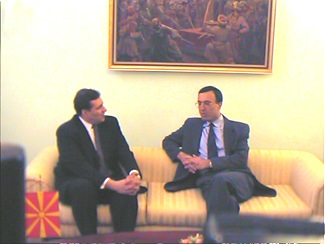 "Bulgaria proved itself to be a good and a sincere friend", Boris Traykovsky said. News.bg President Petar Stoyanov received his Macedonian counterpart Boris Traykovsky, who is in Bulgaria to take part in the European Popular Party summit. The two Presidents discussed the situation in Macedonia, ways for solving the conflict there, and the role of Bulgaria as a warrant for the stability in the region. After the meeting with the Macedonian President, President Petar Stoyanov said in an interview for the News.bg Agency that using armed conflicts to solve problems that could be solved through negotiations should not be allowed any more and under any form. Macedonian President Boris Traykovsky expressed his and Macedonian peoples gratitude for the help that Bulgaria has given to Macedonia in this difficult moment. He also expressed personal gratitude to President Petar Stoyanov, who has turned the attention of international society on the fact that what has been happening in Macedonia is a military extremism that should be denounced. 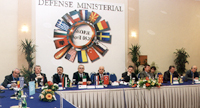 MACEDONIA HAS SUPPORT OF SOUTH EAST EUROPE DEFENSE MINISTERS. MIA Macedonian Defence Minister Ljuben Paunovski, at Thursday press conference, thanked the participants in the Skopje South East Europe Defence Ministerial, for the support and encouragement they expressed to all citizens of Macedonia, disregarding their ethnical belonging, to remain on the path of the ten-year successful model, unique in this region.
Macedonia, as Paunovski said, still insists "with its political conduct and development of democracy to prevent discouragement of integration processes in the region that Europe and NATO offered".
At the bilateral meetings that Paunovski had with defence ministers of Yugoslavia, Croatia, Greece, Romania and Bulgaria, it was talked about "the high responsibility that they all should take in these hard times". Paunovski expressed his satisfaction with the first meeting with defence ministers of Romania and Yugoslavia, and added that the talks went through in a pleasant atmosphere and resulted in undoubted support to Macedonia.
Asked whether there were proposals to deploy the South East Europe Multinational peace forces at the Kosovo part of the border between Macedonia and Yugoslavia, Greek Defence Minister Akis Tzsohazopulus informed that Greece would discuss this issue in the beginning of June. Discussions on this issue would be also led with NATO, the EU, OSCE and all other international organisations relevant to the security in the region.
Albanian Deputy Defense Minister Marco Belo pointed that "NATO's presence and support is enough".
Paunovski, regarding the same question, pointed out that any other form of "additional military presence in the region should go through regular procedures and must be coordinated with the international community". "We must respect any decision adopted after such consultations for are mutual benefit," Paunovski added.
Turkish Defense Minster Sabahatin Cakmakoglu pointed out that Turkey, as a NATO member, and within the frame of the good relations with the EU, is ready to cooperate with the countries from the region on this issue.
On the question whether additional military-technical aid was offered to Macedonia at the Ministerial, in order to improve its ability to prevent terrorist attacks, Minister Paunovski said "the political wisdom of the Macedonian authorities showed that we do not intend to take human lives, even of the people that jeopardize the stability of Macedonia".
According to him, this position is what assured the international community's support, which is no longer only on the phraseology level.
As Paunovski said, in the course of the past two months Macedonia received political support and "offers of military equipment for dealing with this sort of terrorism". He informed that Macedonia was offered help also from the national contingents of countries-members of NATO, as well as from other friends and allies, on the basis of the previous excellent bilateral cooperation. He addressed the journalists and explained that all of the talks were held in the interest of protecting the Macedonian sovereignty and territorial integrity, and not for "starting up some military machinery". According to him, the stability of Macedonia is the key to stability of the region in general.
Albanian Deputy Defence Minister Marco Belo, asked what is his country position concerning the activities of the Albanian factor in the Balkans, and whether NATO and the EU should mediate the dialogue in Macedonia, said "the position of the Albanian Government is to give support to the Albanians living outside their native country, in their efforts to integrate into the democratic societies they are living in".
"Our dream is the integration in the Euro-Atlantic structures, too" Belo said.
According to Belo, the dialogue is the only acceptable means of achieving political goals. "We want for the Albanians to be convinced that their brothers living in Macedonia would talk with the Macedonia Government. We hope that the mediating of NATO and the EU will not be necessary, but if it comes to that, it certainly will not present an obstacle, because those are the institutions for which membership we aspire" Belo said at Skopje South East Europe Defence Ministerial. 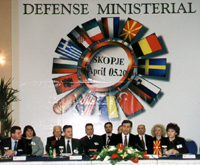 PARTICIPANTS AT SKOPJE MEETING WILL ENFORCE EFFORTS FOR LASTING PEACE. MIA Defense Ministers of 13 participating countries from the region of Southeastern Europe, from NATO and from Partnership for Peace at a conference in Skopje on Thursday agreed to enforce efforts for attaining security, stability and lasting peace in the region and to give their contribution for economic prosperity and welfare through close cooperation.
The Joint Declaration, adopted today by Defense Ministers: Ljuben Paunovski - Macedonia; Ismail Lleshi-represented by his deputy Marco Belo - Albania; Bojko Noev - Bulgaria; Apostolos Tsohatzopulos - Greece; Jozo Rados - Croatia; Sergio Mattarella - Italy; Slobodan Krapovic - Yugoslavia; Ioan Mircea Pascu - Romania; Sabahattin Cakmakogoly - Turkey; Olexander Kuzmik - Ukraine and Donald Rumsfeld - US, represented by Peter Verga, deputy Undersecretary for defense Policy, says that these officials met in Skopje today to promote co-operation among participant countries for maintenance of security, stability and peace in SEE and for more joint activity in the field of prevention and crisis settlement in this region.
Ministers, reaffirming their commitment for respecting the principle of sovereignty, territorial integrity and invulnerability of internationally recognized borders of the countries in the region, strongly condemn all forms of violence as a direct threat to security, stability and peace in SEE. They also strongly condemn terrorist activities of armed extremist groups in the Republic of Macedonia, which represent a threat to its sovereignty and territorial integrity.
Ministers welcome established co-operation of the Macedonian Government with UN, NATO, EU and OSCE in order to address the situation, as well as the decision of NATO to send High Civil Representative of the Alliance in Macedonia. At the same time, they particularly emphasize the meaning of consistent implementation of the UN Security Council Resolutions No. 1244 and 1345.
Ministers welcome the efforts of KFOR for reducing the security risks in the areas of the region which are covered by extremism, terrorism and organized crime, and particularly illegal transfer in arms, drugs and people, with strengthening of the control and security on the state border.
For that purpose, Ministers agreed on enhanced co-operation among border authorities of the SEE countries, through building systems for quick exchange of information, with modern technical equipment for detection of illegal traffic and transfer of arms and drugs as well as through modernization of the border crossings. In addition, participating countries will undertake a number of measures and means in the struggle against international crime in order to prevent and close the international channels of illegal trafficking.
Participating states will increase efforts in collecting small arms from citizens who illegally posses it, strengthening the control of small arms proliferation in the SEE. In addition, they will intensify activities for demining of the territories.
Ministers agreed for the civil control over the armed forces to be realized according to the democratic model of contemporary state in function of full involvement of the participating states in economic, political and military integration.
Ministers agreed on further promotion of mutual relations of the SEE countries, particularly on good neighborly relations. Accordingly, they see it as best expression of readiness for closure of all open issues and creation of real preconditions for faster integration of the countries from this region in the EU and NATO. In this respect, they particularly welcome the efforts of Macedonia for its faster integration in the Euro-Atlantic structures. Its forthcoming signing of the Stabilization and Association Agreement with the EU, represents a positive example and opens the process for faster association in the Euro-Atlantic structures of all the countries in the region. 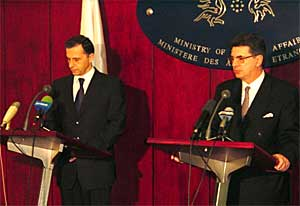 OSCE Chairman-in-Office, Mircea Geoana (left), at a press conference with Macedonian Foreign Minister, Srgjan Kerim, Skopje, 5 April 2001. MIRCEA GEOANA: WE WELCOME INTERETHNIC DIALOGUE IN MACEDONIA. MIA The Chairman-in-Office of the Organization for Security and Cooperation in Europe, Romanian Foreign Minister Mircea Geoana, who is on a one-day official visit to Macedonia, met Thursday with Macedonian Foreign Minister Srdjan Kerim.
After the meeting Kerim said that OSCE has been present in Macedonia from 1992, and in this period of time, as he sad "this organization and Macedonian Government, Parliament and political parties have done together great many things". Kerim added that the cooperation with OSCE would continue in the direction of realizing a series of joint projects.
According to Kerim, the realization of these projects would enable improvement of interethnic relations and quality of living in Macedonia, and thus prepare it for Euro-Atlantic integration. He added that one of the mist important projects of OSCE in Macedonia is the SouthEast Europe University in Tetovo.
On the visit to Skopje Thursday, the Chairman-in-Office met with Macedonian President Boris Trajkovski, Speaker of Parliament Stojan Andov, Prime Minister Ljubco Georgievski, Foreign Minister Kerim and leaders of political parties.
In all his meetings Geoana reaffirmed the support of the OSCE for the independence, sovereignty and territorial integrity of Macedonia, and reiterated his condemnation of recent extremist violence in the country.
"I am impressed by the resolve shown both by Macedonian and ethnic Albanian political parties to start a comprehensive dialogue on the issues that are causing tensions in the country. The OSCE strongly supports this dialogue, and we stand ready to assist in every possible way. The OSCE remains fully committed to coordinate with the EU and NATO in order to assist and facilitate a productive political dialogue" he stated.
Geoana encouraged ethnic communities, as well as the authorities and civil society to rely on the support and assistance of the OSCE Mission to Skopje. The OSCE presence in Macedonia has recently been strengthened in response to the upsurge of violence in the area.
The Chairman-in-Office invited the leaders of the political parties to participate at the Monday historic signing of the Stabilization and Association Agreement between Macedonia and the EU in Luxemburg. 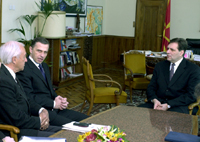 TRAJKOVSKI, GEOANA MEETING. MIA Macedonian President Boris Trajkovski received Thursday Romanian Foreign Minister and OSCE's Chairman Mircea Geoana.
The meeting focused on the topics from the political security situation in Macedonia and in the region. Geoana delivered the OSCE's message of support to Republic of Macedonia regarding the recent extremist and terrorist attacks.
Minister Geoana was interested in the interethnic co-life in Macedonia and expressed his readiness to support Macedonian top officials, adding that he did not come to Macedonia in order to be a mediator.
President Trajkovski emphasized that Macedonia with all its efforts will attempt to be an example of the interethnic co-life in the region, stressing that no one in Macedonia intends to open the Albanian-Macedonian dialogue.
Trajkovski stressed that the intense political talks focus on the improvement of the life of all citizens in Macedonia, and not to certain ethos. Macedonia has the ground for the dialogue, but it will not give any results unless the international community concentrates on the isolation and disarming of the groups in Kosovo, which should be recognized as a source of the regional destabilization. 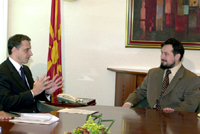 GEORGIEVSKI-GEOANA MEETING. MIA Macedonian Prime Minister Ljubco Georgievski met today with Romanian Minister of Foreign Affairs and OSCE Chairman Mircea Geoana. The meeting was focused on the current situation in Macedonia and in the region.
Prime Minister Georgievski stated that only a month ago, the international community pointed to Macedonia as a good example of interethnic tolerance. In that context, Georgievski said that the terrorism in Macedonia and in south Serbia and what was previously going on in Kosovo was all organized in one place and for that reason this Balkan problem should be put in the focus of international community's interests.
At the meeting, the terrorist attacks were condemned and it was pointed out that the Albanian issues should be resolved through talks, but only with the legitimate political parties of the Albanians. Macedonia rejects federal state. Associated Press & Reuters SKOPJE, Macedonia -- Macedonia's president has ruled out constitutional changes to meet demands by the country's ethnic Albanian community.
Ethnic Albanians have called for changes to the constitution, which names the country's Slavs as the primary nation, that would create a federal state and provide improved rights.
"We have intensified political dialogue but we will not respond to those who suggest a concept of a federal state," Macedonian President Boris Trajkovski said.
"The last 10 years have shown that calls for federalisation merely disguises aspirations for an ethnically clean state," he said.
The development came as international pressure increased for political dialogue between the Former Yugoslav Republic of Macedonia's Slav majority and ethnic Albanian minority.
Mircea Geoana, the chairman-in-office of the Organization for Security and Co-operation in Europe (OSCE), said Macedonian parties should seize the chance of peace offered by the talks.
British Foreign Secretary Robin Cook warned that the time left for meeting the "legitimate aspirations" of the ethnic Albanian minority, one-third of the population, might not be long.
"We must create the political conditions in Macedonia where all citizens know they have equal rights and feel they have equal opportunities," Cook said.
Arben Xhaferi, leader of the Democratic Party of Albanians (DPA), responded by saying the Slav majority was not serious about the dialogue that opened earlier this week.
"They are not ready to have a real dialogue. They want to have some kind of a coffee-table discussion without any obligations," Xhaferi said.
"If we do not open dialogue, the violence will return very easily. The people did not disappear, they are around us," he said in reference to the rebels.
Albania denied Macedonian allegations on Thursday that it had allowed armed guerrillas to enter the Balkan country from Albanian territory.
Albanian newspapers published reports quoting Macedonian Deputy Secretary of Interior Affairs Ljuben Boskovski as saying "armed men with uniforms" had entered Macedonia from Albania.
The government in Tirana quickly denied it saying: "The Ministry of Public Order is totally committed to controlling the Albanian boundary and no illegal crossing has happened or will happen."
Talks to address the ethnic tensions got off to a poor start this week, marred by a boycott by the main Albanian opposition party and Slav protests against concessions.
The talks follow an armed rebellion along Macedonia's northern border with the Yugoslav province of Kosovo by the ethnic Albanian National Liberation Army.
Macedonian forces said last month they had quelled the rebellion by guerrillas who they said were trying to break up the country with violence. Albania denies it let guerrillas enter Macedonia. Reuters TIRANA, Albania (Reuters) - Albania Thursday denied Macedonian allegations that it had allowed armed guerrillas to enter the troubled multi-ethnic Balkan country from Albanian territory.
Albanian newspapers published reports quoting Macedonian Deputy Secretary of Interior Affairs Ljuben Boskovski as saying "armed men with uniforms" had entered Macedonia from Albania, but the government in Tirana quickly denied it.
"The Ministry of Public Order is totally committed to controlling the Albanian boundary and no illegal crossing has happened or will happen," it said in a statement.
"We regret that such untrue declarations do not help to ease the climate in the region," the Albanian ministry statement said, adding that Albania was committed to peace, security and stability in the Balkans.
Macedonian government forces said last month they had quelled a rebellion by guerrillas from the ethnic Albanian National Liberation Army along Macedonia's northern border with the Yugoslav province of Kosovo.
Albania condemned the violence at the time and urged the guerrillas to let politicians deal with any grievances of Macedonia's ethnic Albanian population. |



